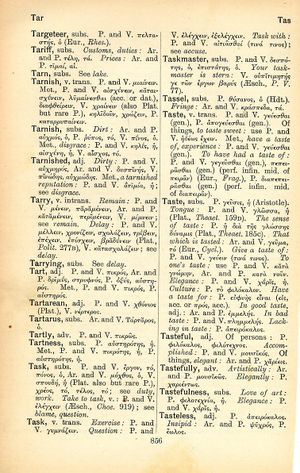taste: Difference between revisions
Ψυχῆς νοσούσης ἐστὶ φάρμακον λόγος → Sermo medela est animi ad aegrimonias → Der kranken Seele Heilungsmittel ist das Wort
(Woodhouse 5) |
(CSV5) |
||
| Line 1: | Line 1: | ||
{{ | {{Woodhouse1 | ||
| | |Text=[[File:woodhouse_856.jpg|thumb|link={{filepath:woodhouse_856.jpg}}]]'''v. trans.''' | ||
P. and V. γεύεσθαι (gen.), P. ἀπογεύεσθαι (gen.). | |||
<b class="b2">Of things, to taste sweet</b>: use P. and V. [[ἡδέως]] ἔχειν. | |||
Met., <b class="b2">have a taste of, experience</b>: P. and V. γεύεσθαι (gen.). | |||
<b class="b2">To have had a taste of</b>: P. and V. γεγεῦσθαι (gen.), πεπειρᾶσθαι (gen.) (perf. infin. mid. of πειρᾶν) (Eur., <b class="b2">Frag.</b>), P. διαπεπειρᾶσθαι (gen.) (perf. infin. mid. of διαπειρᾶν). | |||
'''subs.''' | |||
P. [[γεῦσις]], ἡ (Aristotle). | |||
<b class="b2">Tongue</b>: P. and V. [[γλῶσσα]], ἡ (Plat., ''Theaet.'' 159D). | |||
<b class="b2">The sense of taste</b>: P. ἡ διὰ τῆς γλώσσης [[δύναμις]] (Plat., ''Theaet.'' 185C). | |||
<b class="b2">That which is tasted</b>: Ar. and V. [[γεῦμα]], τό (Eur., ''Cycl.''). | |||
<b class="b2">Give taste of</b>: P. and V. γεύειν (τινά τινος). | |||
<b class="b2">To one's taste</b>: use P. and V. κατὰ γνώμην, Ar. and P. κατὰ νοῦν. | |||
<b class="b2">Elegance</b>: P. and V. [[χάρις]], ἡ. | |||
<b class="b2">Culture</b>: P. τὸ φιλόκαλον. | |||
<b class="b2">Have a taste for</b>: P. [[εὐφυής]] εἶναι (εἰς, acc. or [[πρός]], acc.). | |||
<b class="b2">In good taste</b>, adj.: Ar. and P. [[ἐμμελής]]. | |||
<b class="b2">In bad taste</b>: P. and V. [[πλημμελής]]. | |||
<b class="b2">Lacking in taste</b>: P. [[ἀπειρόκαλος]]. | |||
}} | }} | ||
Revision as of 10:06, 21 July 2017
English > Greek (Woodhouse)
v. trans.
P. and V. γεύεσθαι (gen.), P. ἀπογεύεσθαι (gen.).
Of things, to taste sweet: use P. and V. ἡδέως ἔχειν.
Met., have a taste of, experience: P. and V. γεύεσθαι (gen.).
To have had a taste of: P. and V. γεγεῦσθαι (gen.), πεπειρᾶσθαι (gen.) (perf. infin. mid. of πειρᾶν) (Eur., Frag.), P. διαπεπειρᾶσθαι (gen.) (perf. infin. mid. of διαπειρᾶν).
subs.
P. γεῦσις, ἡ (Aristotle).
Tongue: P. and V. γλῶσσα, ἡ (Plat., Theaet. 159D).
The sense of taste: P. ἡ διὰ τῆς γλώσσης δύναμις (Plat., Theaet. 185C).
That which is tasted: Ar. and V. γεῦμα, τό (Eur., Cycl.).
Give taste of: P. and V. γεύειν (τινά τινος).
To one's taste: use P. and V. κατὰ γνώμην, Ar. and P. κατὰ νοῦν.
Elegance: P. and V. χάρις, ἡ.
Culture: P. τὸ φιλόκαλον.
Have a taste for: P. εὐφυής εἶναι (εἰς, acc. or πρός, acc.).
In good taste, adj.: Ar. and P. ἐμμελής.
In bad taste: P. and V. πλημμελής.
Lacking in taste: P. ἀπειρόκαλος.

